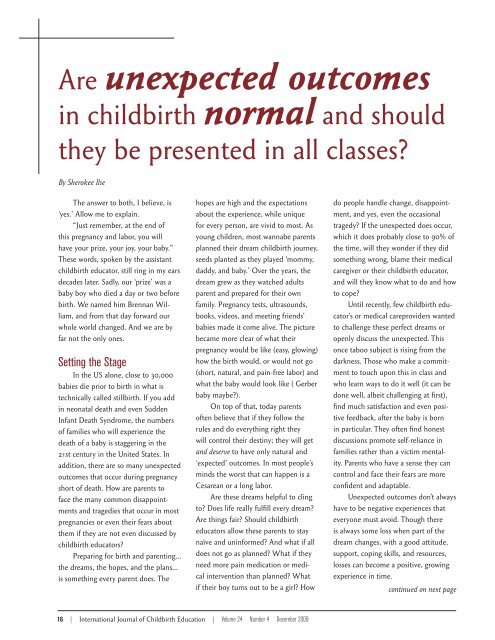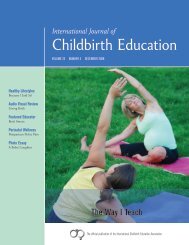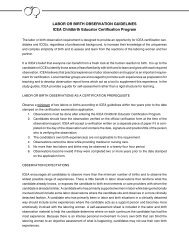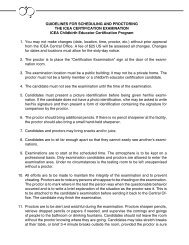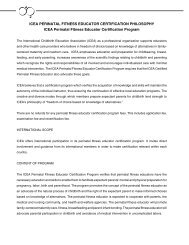Birth Day - International Childbirth Education Association
Birth Day - International Childbirth Education Association
Birth Day - International Childbirth Education Association
You also want an ePaper? Increase the reach of your titles
YUMPU automatically turns print PDFs into web optimized ePapers that Google loves.
Are unexpected outcomes<br />
in childbirth normal and should<br />
they be presented in all classes?<br />
By Sherokee Ilse<br />
The answer to both, I believe, is<br />
‘yes.’ Allow me to explain.<br />
“Just remember, at the end of<br />
this pregnancy and labor, you will<br />
have your prize, your joy, your baby.”<br />
These words, spoken by the assistant<br />
childbirth educator, still ring in my ears<br />
decades later. Sadly, our ‘prize’ was a<br />
baby boy who died a day or two before<br />
birth. We named him Brennan William,<br />
and from that day forward our<br />
whole world changed. And we are by<br />
far not the only ones.<br />
Setting the Stage<br />
In the US alone, close to 30,000<br />
babies die prior to birth in what is<br />
technically called stillbirth. If you add<br />
in neonatal death and even Sudden<br />
Infant Death Syndrome, the numbers<br />
of families who will experience the<br />
death of a baby is staggering in the<br />
21st century in the United States. In<br />
addition, there are so many unexpected<br />
outcomes that occur during pregnancy<br />
short of death. How are parents to<br />
face the many common disappointments<br />
and tragedies that occur in most<br />
pregnancies or even their fears about<br />
them if they are not even discussed by<br />
childbirth educators?<br />
Preparing for birth and parenting...<br />
the dreams, the hopes, and the plans...<br />
is something every parent does. The<br />
hopes are high and the expectations<br />
about the experience, while unique<br />
for every person, are vivid to most. As<br />
young children, most wannabe parents<br />
planned their dream childbirth journey,<br />
seeds planted as they played ‘mommy,<br />
daddy, and baby.’ Over the years, the<br />
dream grew as they watched adults<br />
parent and prepared for their own<br />
family. Pregnancy tests, ultrasounds,<br />
books, videos, and meeting friends’<br />
babies made it come alive. The picture<br />
became more clear of what their<br />
pregnancy would be like (easy, glowing)<br />
how the birth would, or would not go<br />
(short, natural, and pain-free labor) and<br />
what the baby would look like ( Gerber<br />
baby maybe?).<br />
On top of that, today parents<br />
often believe that if they follow the<br />
rules and do everything right they<br />
will control their destiny; they will get<br />
and deserve to have only natural and<br />
‘expected’ outcomes. In most people’s<br />
minds the worst that can happen is a<br />
Cesarean or a long labor.<br />
Are these dreams helpful to cling<br />
to? Does life really fulfill every dream?<br />
Are things fair? Should childbirth<br />
educators allow these parents to stay<br />
naïve and uninformed? And what if all<br />
does not go as planned? What if they<br />
need more pain medication or medical<br />
intervention than planned? What<br />
if their boy turns out to be a girl? How<br />
do people handle change, disappointment,<br />
and yes, even the occasional<br />
tragedy? If the unexpected does occur,<br />
which it does probably close to 90% of<br />
the time, will they wonder if they did<br />
something wrong, blame their medical<br />
caregiver or their childbirth educator,<br />
and will they know what to do and how<br />
to cope?<br />
Until recently, few childbirth educator’s<br />
or medical careproviders wanted<br />
to challenge these perfect dreams or<br />
openly discuss the unexpected. This<br />
once taboo subject is rising from the<br />
darkness. Those who make a commitment<br />
to touch upon this in class and<br />
who learn ways to do it well (it can be<br />
done well, albeit challenging at first),<br />
find much satisfaction and even positive<br />
feedback, after the baby is born<br />
in particular. They often find honest<br />
discussions promote self-reliance in<br />
families rather than a victim mentality.<br />
Parents who have a sense they can<br />
control and face their fears are more<br />
confident and adaptable.<br />
Unexpected outcomes don’t always<br />
have to be negative experiences that<br />
everyone must avoid. Though there<br />
is always some loss when part of the<br />
dream changes, with a good attitude,<br />
support, coping skills, and resources,<br />
losses can become a positive, growing<br />
experience in time.<br />
continued on next page<br />
16 | <strong>International</strong> Journal of <strong>Childbirth</strong> <strong>Education</strong> | Volume 24 Number 4 December 2009


